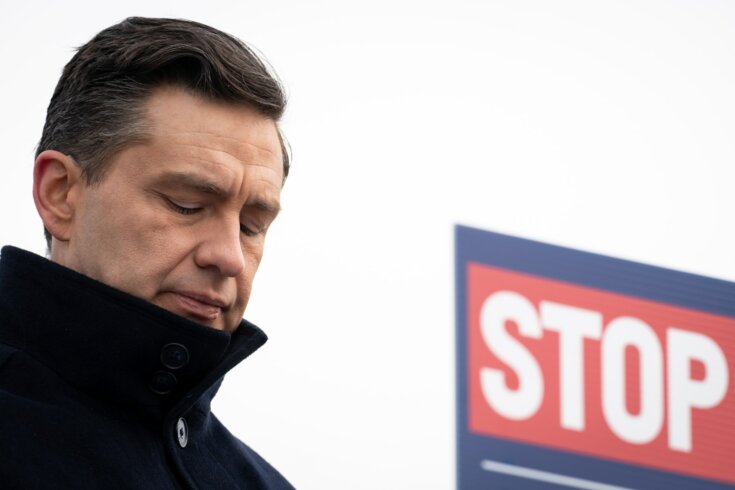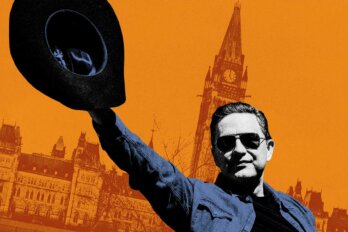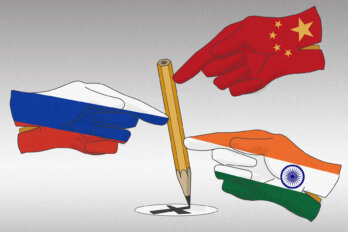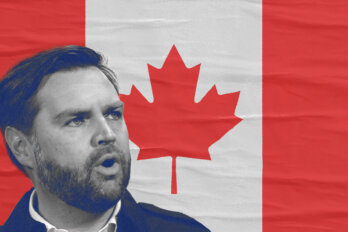I n 1997, Pierre Poilievre was seventeen. He wrote an op-ed for the Calgary Herald that carried the headline “Ripping Off Young People.” The subject was a major reform to the Canada Pension Plan, newly agreed upon by the federal and provincial finance ministers. Young Poilievre’s goal was to deride the reform and blame journalists for being soft on the Liberals.
“One would expect that the introduction of a $10 billion tax increase over a month ago would cause a storm of opposition,” Poilievre wrote. “However, when Paul Martin mentioned that contributions to the Canada Pension Plan would leap from 5.85 per cent to 9.9 per cent, the finance minister felt little more than a gentle breeze.”
The kid from Henry Wise Wood High School said the problem was all the old people in Parliament and “in the media, which is instrumental in assisting a movement develop momentum.”
Andrew Lawton wrote about Poilievre’s youthful op-ed in his 2024 biography of the Conservative leader. Lawton presents the anecdote as proof of the lad’s pluck. Fair enough. But on closer reading, it’s evident little Pierre was making a terrible argument that found no takers among the old people, including in the conservative Alberta government of the day.
An aging population had put the CPP on a straight road to disaster. Payroll contributions were lower than benefits. The program’s unfunded liability was larger than the national debt. So the feds and every province agreed to increase contributions.
But contributions wouldn’t “leap” from 5.85 percent to 9.9 percent. For individuals, the number was never 5.85 in the first place. Employers pay half the program’s cost. So employee contributions—call it a tax, sure, that’s close enough—actually only grew from under 3 percent of wages to under 5 percent. And that “leap” took place over six years of increases, less than half a percentage point per year.
Once the contribution rate finally reached 4.95 percent of wages in 2003, it stayed there for sixteen years. Which meant that it remained in place for every year of the Stephen Harper government in which Poilievre served, as a backbencher and then as a minor cabinet minister.
The pension reform of 1997 saved Canada’s public pension program for a generation, which is why Harper and Poilievre didn’t have to think about it during their decade in power. It was obvious in 1997 that it would have this effect. That’s why then Alberta premier Ralph Klein and his finance minister, Jim Dinning, signed off on the plan in the first place. It’s why Dinning’s successor, Stockwell Day, after making populist hay out of the reform for a few weeks, calmed down by the end of 1997.
As for the media failing to “assist a movement develop momentum,” that’s because the media, like Klein, Dinning, Day, and even the Poilievre of 2006 to 2015, had to operate in the real world, instead of in the world of collegiate movement building.
Before you ask, yes, I do feel ridiculous debating a seventeen-year-old boy who lived in a previous century. I wouldn’t bother, except I’ve come to believe Poilievre would make the same terrible argument today, if he thought it might get him an admiring Instagram comment or an “I’m with you!” from somebody who would never consider voting for anyone else.
He bragged to media personality Jordan Peterson that he’s never changed his mind about anything. This sort of thing is a strength until it’s a weakness. I’ve changed my mind about most things since I was a child. In running for prime minister, Poilievre is applying for adult responsibilities. He’s spent years chasing adults away from him. It’s a problem.
I n November 2001, the Canadian Alliance riding association in Calgary Southwest had what Lawton calls a “tense meeting.” The riding’s incumbent member of Parliament, Preston Manning, had announced his retirement from politics. Manning had lost the new Canadian Alliance leadership contest to Day, and there were factional disputes throughout the party.
With Poilievre’s help, a young lawyer and self-described “Stockaholic” named Ezra Levant managed to purge the Calgary Southwest riding association board of Manning loyalists. “Suddenly, two twenty-somethings held sway over one of the most prestigious electoral districts in the country,” Lawton writes.
Levant wanted to succeed Manning as the riding’s MP. He won the nomination by acclamation. Winning the election should have been a formality. Manning had defeated the second-place candidate in Calgary Southwest four to one in the 2000 election. With Poilievre as his communications director, Levant set about sewing the riding up.
“Even before the by-election had been called, Levant had spent, by some reports, upwards of $150,000 on a startlingly aggressive campaign that included billboards and advertisements on both television and radio,” Lawton writes. “It was an air war rivaling what some national campaigns would have put together.”
Levant’s campaign faced two obstacles: first, the Progressive Conservatives had nominated a popular lawyer named Jim Prentice as their candidate. Second, Harper, the new Canadian Alliance leader, wanted to run in the riding to get into Parliament. After much hesitation, Levant withdrew so Harper could become the party’s standard bearer in Southwest. Prentice, too, declined to run, in a concession to the quaint tradition of giving national party leaders an easy path to Parliament. Harper took Southwest in a walk.
Harper and his strategist, Tom Flanagan, have always maintained that, before Harper stepped in, Levant and Poilievre were busy turning a sure win into a possible defeat.
Here’s how Flanagan tells it in his 2009 book Harper’s Team:
In an April 2002 interview with the National Post, Harper was more categorical. Reporter Robert Fife’s account:
He said Mr. Levant’s attack ads against the Liberals and Tories and take-no-prisoners style of campaigning have destroyed the party’s credibility in an Alliance bastion.
Mr. Harper said the party probably would have lost the riding to Jim Prentice, the Progressive Conservative candidate.
“Polls show that just before Mr. Levant stepped down, we were 12 points behind the Conservative opponent in the party’s bastion,” he said.
It took work to jeopardize the Alliance lead in Calgary. That’s like turning Italy against pasta. Probably most of us couldn’t have done it. The ad copy Poilievre wrote for Levant had a single theme: protecting the oil patch against environmentalists. (Hence “Kyoto Joe”; kids, ask your parents.) The drama generated by the two twenty-somethings started to wear voters out. With Prentice, the Progressive Conservatives offered an unspectacular candidate who at least seemed serious.
Today the person who most resembles the 2002 Pierre Poilievre is Pierre Poilievre. The person who most resembles Jim Prentice is Mark Carney.
W hat Poilievre wants to do is difficult and rare. Leader of the official opposition sounds like the ideal preparatory role for somebody who wants to become prime minister, but in fact, it’s perilous. I’ve covered nine federal elections since 1997. The incumbent leader of the official opposition party lost eight of them: Manning (1997), Day (2000), Harper (2004), Stéphane Dion (2008), Michael Ignatieff (2011), Tom Mulcair (2015), Andrew Scheer (2019), and Erin O’Toole (2021). Seven of the eight losing opposition leaders were not permitted to lead the party into the next election. Harper in 2006 was the only official opposition leader since 1997 to try again and the only one to win.
The job, as conceived by a long succession of Canadian opposition parties, makes its occupant sound ridiculous. Each new leader is told by his best friends: The job is to oppose. You don’t have to propose anything. You don’t have to co-operate. It’s your constitutional role! Great, but who acts like that in real life? “Hi, thanks for having us over. I hate your dining room! Wow, this food is lousy. What’s wrong with your dog?” Harper showed in the early days of the 2005/06 campaign that it’s possible to pivot, quite suddenly, to hope. We’re about to see whether Poilievre can do the same, or whether he wants to.
I maintain that Poilievre has been unusually detailed in his policy proposals, certainly providing more concrete policy ideas, earlier, than Justin Trudeau did from his third-party perch in 2015. The proposals aren’t always persuasive. In general, he seems to view government as a medieval office for the allocation of penances and indulgences. He’ll reward cities that build homes, as though cities built homes, and punish those that don’t. He’ll withhold research funding from universities and operating grants from museums that displease him—which incidentally is the only way we know he plans to have budgets for research and museum operations. He’ll reward provinces for reducing trade barriers. What if, in two years, a province frees trade but suffers a housing slump and runs a university where somebody is found guilty of being woke? “You net out at $50 in the hole. Pay at the next wicket.”
The good news is, tallying up each province’s gifts and fines will be easier for Poilievre than meeting anyone to talk about anything. “I meet with people I disagree with all the time,” he said during the Freedom Convoy, as a way of chiding Trudeau for not sending federal emissaries to talk to the protesters. Really? Meets with people he disagrees with all the time?
Poilievre spent two years swearing he was different from Trudeau in every respect, but both are products of their era, which prizes slogans and despises uncertainty or contradiction. So the two were the most exquisitely bubble-wrapped and scripted leaders I’ve ever covered. Matching wind-up dolls. Axe the tax, fling the bling, hoist the joist, but have you ever heard Poilievre say, “Gee, I was not expecting that to happen,” or “Let me ask some people who know more about that than I do, and I’ll get back to you”?
His speech at the Ottawa “Canada First” rally was about how he’s thought hard about the events of the past half year, and the amazing thing about it is that he saw it all coming and it all proves he was right about everything. That must feel great. I’m just guessing, because to me, the past half year has been one astonishment after another, and I’m not even sure oranges are still orange any more.
In one of his exceedingly rare interviews with someone who didn’t have to tick off an ideological checklist on her way in, Poilievre said something surprising. Who does he admire in politics? Wilfrid Laurier. That’s not the big surprise. Laurier is a sturdy model with some cross-partisan hot sauce, good for Poilievre. But here’s the reason he gives: “He was also a master conciliator between French and English, Protestant and Catholic. He found clever compromises that allowed people of different faiths to live out their aspirations without stepping on each other’s toes. That’s one of the magical things about Canada, that by giving everyone their individual freedom, we make it possible for people of different faiths and backgrounds to co-habitate in harmony.”
I take this ode to be heartfelt. Poilievre’s role model is a master conciliator who found clever compromises so people could co-habitate in harmony. In a similar vein, I have always wanted to be Michael Jordan. In a later interview, Poilievre called oil company lobbyists “idiots” five times. Laurier-esque.
T his winter, I published 2,500 words on Poilievre that did not include the word “Trump.” I find the comparison so approximate as to be unhelpful. Poilievre has always come across as more of a Nixon, or a Laurier if you like. But we operate within contexts, and the context of Poilievre’s greatest fight is that Trudeau has retired to Canadian Tire but Trump is still in the White House. The American president will be the ballot question in this election. He’s why Poilievre is facing Carney instead of Trudeau, and he’s why Poilievre is now less sure to win.
Trump has already weighed in on his preferences for our election. Naturally, everyone is taking his bored musing as confirmation of whatever they already wanted to believe. But Trump represents a practice of government, not just a news clip, and he has established a track record on policy files where Poilievre has mostly generated only questions.
Poilievre wants a “warrior culture, not a woke culture” in the Canadian Armed Forces. In Washington, that meant firing the country’s top military officer for talking in public about being Black, and scrubbing a government website so it would no longer discuss the Tuskegee Airmen or the Navajo code talkers. Is that what a Canadian warrior culture would look like?
His comments on withholding funding from universities and museums came before Columbia University lost $400 million (US) in funding for being the site of anti-Israel protests and the University of Pennsylvania lost $175 million (US) for letting trans athletes compete in women’s leagues. The architect of the Trump administration’s university policy, Chris Rufo, spoke at a Canada Strong and Free conference in Red Deer in September. Any leader can take or leave any advice. What part of Rufo’s advice will Poilievre take or leave?
Of course, there’s no chance Poilievre will address those questions in those terms, but as I’ve sought to demonstrate before, events raise questions whether a leader answers them or not. Trump poses a present threat to Canada’s prosperity and security. It is now clearly untenable for any administration official to remain in a position of influence without parroting his threats. I don’t know about you, but I am surprised by this turn of events, and I think we should talk about it. Instead, Poilievre has boiled it down to two new phrases in his stump speech: “unjustified and unjustifiable” and “slow to anger.”
I’m as sure of this as I am of anything: Poilievre is limited in how much he can say about Trump because some Conservatives find Trump appalling and some think he’s fantastic. Liberals think every Conservative is the same, but what’s been striking is who’s found their voice during Trump 47 and who hasn’t. Harper knows what he thinks. Jason Kenney does. Poilievre, not so much, and the people he’d have thought would be natural allies smell his hesitation.
Poilievre is not destined to lose, but he’s vulnerable because the feeling that he was destined to win has dissipated. That feeling was an artefact, one he crafted with real skill, using his opponent’s many flaws to distract from some of his own. He’s facing a new opponent, who is new to campaigning and can jettison only so much of the Trudeau record. It’s hardly obvious who’ll win.
But every election produces a winner. Fewer produce a successful prime minister. Beating Carney will be a challenge, if Poilievre can do it, but it’ll be nothing compared to the challenge of governing. I’m not sure the habits he’s honed dispose him to success in that larger enterprise.
Adapted from “A Brief History of Not Being Great at This” by Paul Wells (Substack). Reprinted with permission of the author.





